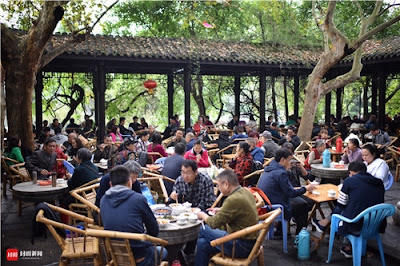Tango is not just a fascinating dance—it is a rich philosophy, culture, and way of life. The search of tango is the search of connection, love, fellowship, unity, harmony, and beauty—an idealism that is not consistent with the dehumanizing reality of the modern world. The world divides us into individuals, but tango brings us together as a team and community. In tango we are not individualists, feminists, nationalists, Democrats, or Republicans—we are simply human, intertwined and interdependent. Tango invites us to tear down walls, build bridges, and rediscover our shared humanity through connection, cooperation, accommodation, and compromise. It is a dance that reminds the world how to love.
January 7, 2022
Tango in Small Cities
In Chengdu, China, teahouses dot the streets and alleys, each one brimming with life. More than just places to drink tea, they serve as lively social hubs where locals gather to spend time together: converse, read, play chess, enjoy traditional opera, and more. This unhurried ritual is deeply ingrained in the daily rhythm of Chengdu life.
Similarly, in Buenos Aires, the milonga holds a special place in the hearts of its people. Just as teahouses are to Chengdu, the milonga is a cherished cornerstone of local culture. Scattered throughout the city, these venues are where Porteños meet friends, sip coffee, listen to music, and dance tango. Over time, many become skilled dancers, and tango become an essential part of their daily lives. For countless Porteños, a day without tango feels incomplete.
However, tango dancers in smaller cities aren’t as fortunate. With too few dancers to sustain regular milongas, they face unique challenges. I know this struggle firsthand—I used to drive to nearby cities to dance tango. A three-hour milonga often meant five hours on the road. The sleepless nights, fatigue, and mounting costs eventually took their toll, forcing me to adjust to the reality of dancing locally.
Dancing locally may not offer the same thrill as big-city milongas, but it brings convenience, affordability, and sustainability. While occasional trips to larger cities can be enriching, tango aficionados in smaller towns must recognize the value of cultivating a local scene. In major cities, established tango communities provide structure and support, but in small towns, that responsibility falls on us. Building a tango community is no easy feat, yet it is essential. If we rely on long-distance travel, exhaustion or life circumstances will eventually catch up with us, leaving tango out of reach. Instead of waiting for that day, why not invest our energy into creating a thriving local community—one that allows us to enjoy tango just as dancers in larger cities do?
Dancers in small towns must adopt a strategic mindset. We can’t wait for others to create opportunities for us—we need to take initiative, plant seeds, and tend them until they grow. Building a tango community takes time, patience, and effort, but the investment pays off. Don't be afraid of starting small and slow, as long as we stick to the cause, the start-up phase will pass. With time, we will grow stronger. Instead of seeking dance elsewhere, our focus should be on improving our local group.
The importance of building a local tango group cannot be overstated. It’s not just where we hone our technique—it’s where we form the bonds that make tango truly special. Tango is a fellowship, a shared experience. Without a team, there is no tango. While it’s tempting to seek out more established communities, why not invest in our own? As dancers, we must think not only about the present but also about the future. Let’s prioritize team-building alongside personal enjoyment and aim to contribute as much as we receive. I willingly provide a place for our group to dance as my contribution, but I hope others will also step up—not as a favor to me but as a way to strengthen our community. Don’t come just for the fun. Ask yourself: “What have I done for the group lately?” If everyone plays their part, our local tango community will flourish. And one day, tango will become an indispensable part of our daily lives as well (see Never Forget Why We Started.)
Subscribe to:
Post Comments (Atom)

Thanks, Paul. We here in Iowa are just starting to reorganize ad we try to move forward after the quarantine from the pandemic. It has been 2 years since we have had tango gatherings and we need to see what the future brings as compared to trying to resurrect the past. Thanks for a great information Al and motivating article.
ReplyDelete